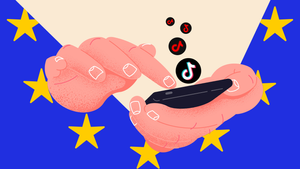TikTok has committed to permanently withdraw a rewards programme from the stripped down ‘Lite’ version of its app for users in the European Union.
The rewards programme, which is only available in TikTok Lite, allows users to earn points in return for watching videos and fulfilling other tasks. Users can then redeem their points for Amazon vouchers and TikTok coins. EU officials raised concerns about the addictive effect of the scheme and began formal proceedings against it in April.
TikTok’s agreement to withdraw the Lite rewards programme in Europe will be legally binding under the EU’s Digital Services Act, and the platform has also agreed that it will not “launch any other programme which would circumvent the withdrawal”. As a result, if TikTok breaches its commitment to permanently withdraw Lite rewards, it would be in breach of European law, and could be fined by the EU.
The European Commission announced the agreement with TikTok yesterday. It means there is one less legal spat on the to-do list of TikTok’s legal team, freeing up more time to continue fighting the US law passed earlier this year which forces TikTok’s Chinese parent company ByteDance to sell the app, or face it being banned. On that particular front, TikTok’s lawyers complained yesterday that the US government’s recent submission justifying the ‘sell-or-be-banned’ law is partially confidential.
Back in the EU, Thierry Breton, the EU Commissioner For Internal Market has welcomed TikTok’s commitment to drop Lite rewards., “The available brain time of young Europeans is not a currency for social media, and it never will be”, he says, “We have obtained the permanent withdrawal of the rewards programme, which could have had very addictive consequences”.
Margrethe Vestager, EVP for A Europe Fit For The Digital Age, adds, “The safety and well-being of social media users need to be a number one priority. Design features on platforms with addictive effects put the well-being of their users at risk”.
This is why TikTok’s commitment regarding the rewards programme has been made legally binding, Vestager explains, and it will be carefully monitored. She concludes “Today’s decision also sends a clear message to the entire social media industry”.
TikTok Lite is a version of the video-sharing app designed to perform better over slower internet connections, and which lets users watch videos, but not upload their own content.
It first launched in Thailand in 2018, but until recently was not available in Europe. That changed in April, when TikTok Lite launched in France and Spain, and almost immediately attracted the attention of EU regulators.
The European Commission then launched formal proceedings on 22 Apr, on the grounds that TikTok had failed to submit a risk assessment report regarding the rewards programme before launching the Lite app within the EU, something it is obliged to do under the DSA.
TikTok voluntarily suspended its rewards scheme for users in the EU two days later. That suspension has now been made permanent.
The EU is also investigating TikTok to assess whether or not it is compliant with DSA rules around transparency, data and protections for children. That investigation is ongoing.
Meanwhile in the US, TikTok continues to fight the sell-or-be-banned law that was passed by US Congress earlier this year.
The US Department Of Justice recently submitted a lengthy filing with the court where TikTok is challenging the law, arguing that the measures are justified in order to address concerns that the Chinese government has access to US TikTok user-data via ByteDance.
Some of the DoJ’s submission was filed with the court confidentially and is therefore redacted in the publicly available version. TikTok has criticised that move and claimed yesterday that it had already found factual errors in that part of the submission that is in the public domain, saying, “there is no telling what errors are buried in the secret filings”.
It urged the court to not allow the redactions, adding, “Sunlight is said to be the best of disinfectants, but the government wants this case to be litigated in the dark - with the free speech rights of petitioners and 170 million Americans hanging in the balance”.

